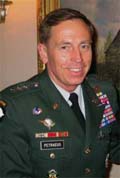US eyeing areas in Iraq for more cuts, top commander says
 Washington- The top US commander in Iraq, , said Wednesday he has begun looking at areas for additional troop pullouts, but cautioned there should be no more reductions until the security situation can be evaluated.
Washington- The top US commander in Iraq, , said Wednesday he has begun looking at areas for additional troop pullouts, but cautioned there should be no more reductions until the security situation can be evaluated.
Petraeus, in his second day of testimony before Congress, defended his recommendation to keep 140,000 troops in Iraq after last year's troop buildup ends in July.
He has faced criticism from Democratic lawmakers for not developing a more rapid plan for cutting the size of the US presence in Iraq.
"We're looking at four or five locations already that we have an eye on, looking to see if those (security) conditions can be met there," Petraeus said. "Again, we have a number of months and a number of substantial actions to take before then, but we are already identifying areas that we think are likely candidates for" further reductions.
Petraeus has called for a 45-day pause in withdrawals once the troop surge concludes in July, to examine security and the ability of Iraqi forces to take more responsibility for the task.
Petraeus and the US ambassador to Iraq, Ryan Crocker, appeared before the House Armed Services Committee for the second day of hearings after spending Tuesday in the Senate. The two men will then go before the House Foreign Affairs Committee later Wednesday.
Democrats opposed President George W Bush's surge plan that added 30,000 troops to the fight in Iraq last year, and have unsuccessfully sought to enact timeframes for withdrawing soldiers.
Democrats believe pullout deadlines will pressure the Iraqi government to overcome ethnic differences and enact legislation aimed at reducing tension between Shiites, Sunnis and Kurds.
"The surge in forces in the counterinsurgency doctrine has led to reduced violence," said Ike Skelton, the chairman of the committee. "And its purpose was to create political space for the Iraqis to move forward on reconciliation within its government and within its people."
"We know there's been some incremental progress, but there's not been this fundamental reconciliation," Skelton said.(dpa)